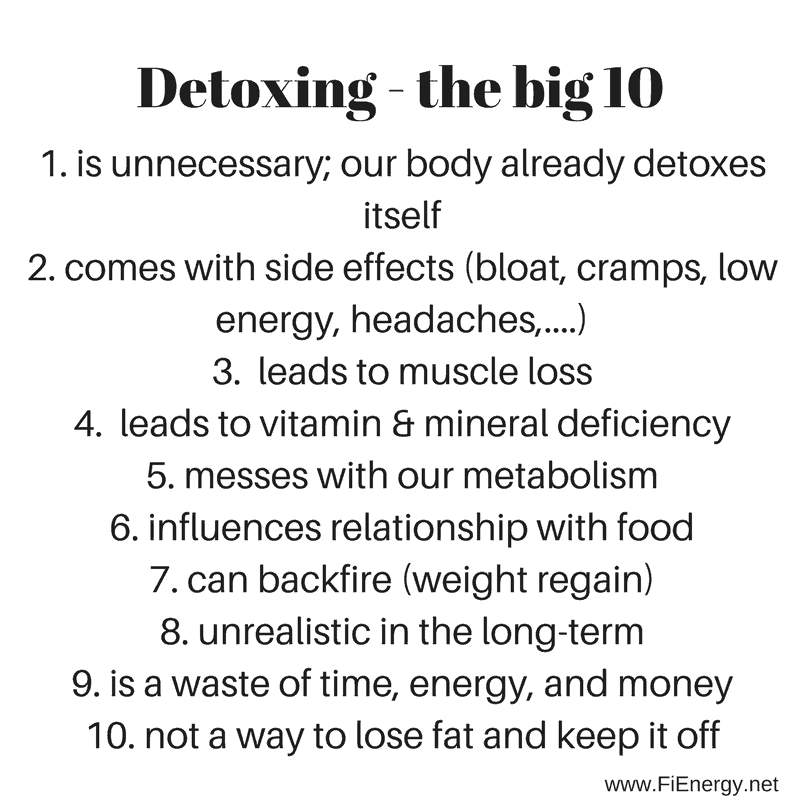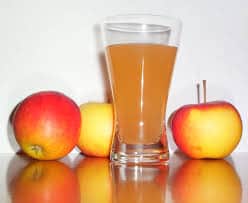The beginning of a new year, for many it means it’s time to give our body a reboot from weeks of indulgences and tasty tidbits, time to eat a bit healthier and lose a few pounds (or kgs).
Detox and fasting – the way to lose the weight and reset my body
~ is it?
While there are tons of variations of detoxing and fasting diets, many promise the same: better health, quick weight loss, more energy, and a rejuvenated self – and of course – getting rid of toxins. But do they work or are they just a marketing gimmick?
Regardless of kind of diet, people tend to choose a detox, fast or juice diet for the many promises.
Highlighted benefits of a juice detox include:
- quick weight loss (don’t read this as fat loss!)
- improved nutrient absorption
- lower cholesterol
- liver detoxification
- better skin
- increased intake of a variety of vegetables
just to name a few. Detoxes are easy (in terms of simplicity) and convenient, but also pricey.
A 3-day juice detox can cost anywhere from € 99 and more
18 bottles of juice consumed over a 3-day period. And that’s a short detox! But, we tell ourselves we can do anything for three days, a week or even a month, right? Especially if it means quick weight loss and more energy.
Detox diets proclaim to clear the body of waste & toxins.
~
But,
what waste?
what toxins?
If constipated, aren’t there better ways to get things moving again?
When I talk about detoxing, read detoxification, I don’t talk about a healthy, sustainable way of eating that is filled with a variety of food choices including several portions of different vegetables and void of excess sugar per day but also low in external hormones, pesticide, and chemicals.
Rather, a talk about a restriction of numerous food groups, often solid foods; a diet super low in calories. A diet that’s said to have a detoxifying effect and that’s sustainable only short-term.
Detox-Diets
I’m not sure why we believe marketing ads, perhaps because they are convincing. Yet, definite research on the successes of detoxes are lacking (Klein & Kiat, 2015; Allen et al., 2011).
Partially perhaps, we feel overly guilty of weeks or months of consuming unhealthy food – too fatty, too sweet, too heavy, too ….. everything. We desire a quick fix.
Perhaps, we feel guilty about our unhealthy lifestyle choices. We know we should eat healthier, should consume more vegetables and less heavily processed food.
We drink too much coffee or alcohol and don’t sleep nearly enough.
On top of that, most of us manage a lifestyle that’s way too stressful and hectic. Not to forget about all the pollutants, smog, industrial chemicals, pesticides, heavy metals and radioactive elements we are surrounded by.
We are told our body can’t handle all this toxicity, all this stress.
We are told, these are factors that contribute to illness and disease and weight gain (yes, some do but a detox isn’t the solution!) (Sears & Genuis, 2012).
In all this we forget one thing: we have 4 main organs that support our body in detoxing naturally: liver, kidney, lungs, and skin.
What we also forget is that in order to excrete toxins our gut, intestines, and digestive system need to work well and efficiently.
–> the basis of every detoxification must be properly functioning organs that support detox!!!
But more later,…..
~
The idea to remove toxins from the body
is an integral part of
Ayurvedic, yogic, & naturopathic medicine.
~
Friend or Foe
 Hence, when diet ads tell us detoxing and fasting allow us to clean and reset our system we believe it, especially when celebrities swear by them and contribute their success to them.
Hence, when diet ads tell us detoxing and fasting allow us to clean and reset our system we believe it, especially when celebrities swear by them and contribute their success to them.
But wait, what do these people look like a month later? Did they regain the weight? What happened to their eating habits?
We believe almost anything that promises a relief of toxins, of unwanted weight (fat), and of feeling dull and blah.
Just like the lemonade aka Master Cleanser detox diet which has been around for nearly 50 years, consisting of 6-12 glasses of water mixed with lemon juice, cayenne pepper, and maple syrup, plus a laxative at bedtime. Or how about a 60 day juice- only diet?
Could you imagine just drinking fruit and vegetable juices for 60 days? No chewing, no biting; just sipping? Worse, not knowing if all this is truly „detoxing“ our body? Do you know for sure you liver and kidney are working well? No leaky gut syndrome, no digestive issues?
It’s the beginning of yet another New Year and we are motivated, motivated to do something good for ourselves. Motivated to lose weight and motivated to become a bit more health- conscious.
We don’t question if the advertised benefits are actually possible; as with most things in life, we believe what we are told.
Yet, we are not told that for a body to detox itself, using its organs, the organs need to function properly! Once we KNOW all systems work properly then we can focus on identify certain toxic substances which we carry (too heavily) and use specific substances to encourage excretion of these identified toxic substances. A juice detox diet will NOT take care of this.
More,
Clear research on the positive effects of detox diets as well as long-term health and weight benefits are lacking
(Klein & Kiat, 2015; Sears & Genuis, 2012).
More, our organs (especially kidney and liver) already do a magnificent job (as long as we have not been diagnosed by our doctor otherwise).
Downfall of Detox and Fasting Diet
We should know by now, any diet we go on, any drastic change in eating behavior, tends to backfire.
Detox & fasting diets, particularly in people with eating disorders, lead to binge- eating attacks post diet as well as weight re-gain.
More, such diets contribute to muscle loss, as if most of you really need to lose muscle mass!
Initially, we don’t lose fat but rather water weight, and although we might feel we are losing weight giving super low caloric intake, weight regain is almost guaranteed (Obert, et al., 2017).
They can contribute to blood- sugar problems (contingent on overall health).
Depending on type of detox or length of fast, vitamin and mineral deficiency is a real risk.
Health benefits of low or super low caloric diets (as the case with detox) is lacking (Avenell, et al., 2004), although, on another note, low caloric diets are said to slow aging.
Flushing out the bad stuff also flushes out the good, especially if engaging in a cleansing laxative – type detox diet.
–> All of this, more or less, can weaken our body’s immune system and ability to fight inflammation.
But, it should be mentioned that Korean researchers (Kim, et al., 2015) concluded that a 7 day lemon detox diet reduced body fat and insulin resistance in overweight women. However, post- 7 day eating behavior and subsequent potential weight and health changes were not observed.
Healthy eating habits support our body (organs) in detoxing processes.
Detox diets are unnecessary and might do more harm than good.
Let’s just address one marketing gimmick:
Juice detox diets are said to improve nutrient absorption and ease our digestive system.
You know why? They are stripped of fiber! That’s why, for example, the Master Cleanse diet, requires a laxative at night. Without fiber you are bound to get constipated. And yes, fiber slows digestion. But, fiber, too, keeps us full. While fruit and vegetables are loaded in nutrients, fruits are high in sugar and void of protein and fiber. Without fiber, sugar is taken up immediately…….I am sure you have experienced sugar rush from eating too much candy, or?
So, if advertisements state, „it eases our digestive system“ please question the meaning of „ease“!
But it is true, if you don’t consume any fruit and vegetables as part of your meals such juices can support you in increasing your fruit and vegetable intake. But do you truly want to pay this price tag when you, just as well, could have had an apple, a salad or a side of veggies?
Detox diets don’t detox the body.
Rather, it’s the sudden surge in vitamins, minerals, and fiber (if consuming raw fruits & veggies) we now all over sudden start to consume that support our body in detoxing itself!
Many choose to detox even though, for example, Sense About Science as well as the British Dietetic Association have described some detox diets „nonsense“, a „marketing myth“ (BDA), and „a waste of time and money“ (SAS).
A 2015 review published in Nutritional Science looking at clinical evidence about detox diets and concluded:
„At present, there is no compelling evidence to support the use of detox diets for weight management or toxin elimination. Considering the financial costs to consumers, unsubstantiated claims and potential health risks of detox products, they should be discouraged by health professionals and subject to independent regulatory review and monitoring.“
Detox diets can set most of us 10 steps back, instead of 10 steps forward.
A more natural, delicate way to detox and reboot our body:
Detox and fasting diets, for most of us, aren’t the way to lose weight successfully. To the contrary. I find them too extreme, and in most people they’ll lead to undesired effects.
So what’s a better, more gentle approach?
Get a medical check up and assure you are indeed healthy.
Keep track of your bowel movements and how you digest food. Any intolerance?
Develop healthy eating habits, by making healthy eating part of our lifestyle!
By increasing fruit and vegetable intake, preferably local and organic we support our body in doing its job.
Nothing speaks against a soup and only veggies day.
It’s also okay to skip a meal, as long as you feel healthy, stay hydrated, and don’t overcompensate with unhealthy food choice during subsequent meals.
Nothing speaks against „fasting“ one day or substituting one meal with a veggie smoothie or thin soup. As long as it works with you and your eating habits, health, and energy demands.
Eating healthy might mean eating less. It might mean eating more, of the good stuff. Eating healthy should be sustainable eating, balanced eating. There is no expiration date to eating healthy!
Detoxing also mean s cleaning up our environment! Removing plastics, avoiding chemicals (even heavy cleaners), and placing a few plants around our home.
It also means, don’t run or exercise near heavily polluted streets or industries.
Bottom line, if we don’t uptake or limit our uptake of toxins our body doesn’t need to work as hard in eliminating them (plus, reduced uptake reduces risk of toxin build up in the body).
But , I also want to make clear,
„Lack of evidence for an effect of detox diets does not mean
lack of effect.
There may be benefits for some form of detox programs.“
Healthy eating can be a form of detox in itself. Healthy eating might or should include herbs, spices, and dried algae, loads of vegetables and some fruit. But not juiced, rather raw or steamed (veggies) as fiber is our friend.
Chlorella – an algae with toxin release potential?
Coriander – an herb with toxin release potential?
~ (Klein & KIat, 2015)
Why I don’t like juice-detoxes
In addition to outrageous pricing, produce waste, and false (!) advertisement juicing provides us mainly with sugar (along with vitamins, minerals, and phytonutrients).
Juicing removes the natural fiber found in fresh produce
Contrary to blending, juicing removes fiber, the thing that actually contributes to fullness and stable blood sugar levels.
Juicing is full of fruit sugar (!) which will quickly raise blood sugar levels……but also leave us hungry and perhaps grouchy shortly after.
Juice detoxes fail to encourage healthy eating habits and food choices.
Detoxes are presented as a one-size fits all solution.
Just think about it:
to get one glass of freshly squeezed apple juice (perhaps mixed with carrots and other green veggies) you need at least 3 apples coming it at perhaps 30 g sugar (continent on size of apple), almost no fiber. Eating one full apple, however, which I’m sure will keep you full a tad bit longer (especially if combined with some nuts, nut spread or cheese) will provide you 10 g of sugar and 2.4 g of fiber.
Thus, while some people do well on exposing their body (& mind) to a detox and view this as a reboot to get cravings and unhealthy food desires out of their system, others experience it as a stressing event with undesired outcomes.
What many people overlook as well is the benefit of detoxing from all stressors of life is this fact: drinking 3 or 6 or even 60 days of fruit and vegetable juices while continuing a stressful, sleep-deprived lifestyle is far from optimal, and far from health supporting.
Thus, if detoxing is the goal, align other lifestyle choices with that goal.
By not toxing your body in the the first place,
there is no need to „detox“.
The best way to live a „detox“ lifestyle is by making healthy, balanced food choices, by exercising regularly, by choosing less stress, less pesticides, and less chemicals over more, and by committing to a positive and mindful, sustainable lifestyle.
Sources:
Avenell A., Broom J., Brown TJ., Poobalan A., Aucott L., Stearns SC., Smith WC., Jung RT., Campbell MK., Grant AM. (2004). Systematic review of the long-term effects and economic consequences of treatments for obesity and implications for health improvement. Health Technol Assess, May;8(21):iii-iv, 1-182. https://doi.org/10.3310/hta8210.
Allen J., Montalto M., Lovejoy J., Weber W. (2011). Detoxification in naturopathic medicine: a survey. J Altern Complement Med, Dec;17(12):1175-80. doi: 10.1089/acm.2010.0572.
Kim MJ., Hwang JH., Ko HJ., Na HB., Kim JH. (2015). Lemon detox diet reduced body fat, insulin resistance, and serum hs-CRP level without hematological changes in overweight Korean women. Nutr Res, May;35(5):409-20. doi: 10.1016/j.nutres.2015.04.001.
Klein AV., Kiat H. (2015). Detox diets for toxin elimination and weight management: a critical review of the evidence. J Hum Nutr Diet, Dec;28(6):675-86. doi: 10.1111/jhn.12286.
Obert J., Pearlman M., Obert L., Chapin S. (2017). Popular Weight Loss Strategies: a Review of Four Weight Loss Techniques. Curr Gastroenterol Rep, Nov 9;19(12):61. doi: 10.1007/s11894-017-0603-8.
Sears, ME., & Genuis, SJ. (2012). Environmental Determinants of Chronic Disease and Medical Approaches: Recognition, Avoidance, Supportive Therapy, and Detoxification. J Environ Pub Health, Vol. 2012, Article ID 356798, 15 pages http://dx.doi.org/10.1155/2012/356798








Pingback: Thinking about having a child - nutrition tips for moms to be. Dr. Yvi Schroeder, CPT
Pingback: Added sugar, nutrition fact labels, and examples why it matters • Fitness trainer & health coach, Wien - Fit & Fabulous with Coach Yvi
Pingback: 3 fat storing hormones & their effect on weight • Fitness trainer & health coach, Wien - Fit & Fabulous with Coach Yvi
Pingback: Factors affecting weight loss - it isn't just hormones • Fitness trainer & health coach, Wien - Fit & Fabulous with Coach Yvi